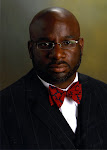 Each time that I've attended the General Conference, there has been a moment when I've realized like Moses that I was standing on "holy ground." That moment occurred this year when the presumptive nominee for president of the Democratic Party, Barak Obama, addressed the Conference. The afternoon was truly electric! It must've been the way it felt to see Dr. Martin Luther King, Jr. speak at the March on Washington.
Each time that I've attended the General Conference, there has been a moment when I've realized like Moses that I was standing on "holy ground." That moment occurred this year when the presumptive nominee for president of the Democratic Party, Barak Obama, addressed the Conference. The afternoon was truly electric! It must've been the way it felt to see Dr. Martin Luther King, Jr. speak at the March on Washington.Like many others, my eyes began to fill up with tears, so overcome by the emotion of the day. My mother and my aunt, both born in Arkansas were there that day in the packed out St. Louis Convention Center. All I could think about was how they were barred from the movie theater growing up (and confined to the balcony on days they could attend) in their hometown. How they were forced to attend segregated schools and use public accommodations for "blacks only." Yet, there they were looking at something no one could have dared to believe just 40 years ago.
I'm indebted to my cousin, the Rev. Reginald Terry, pastor of Antioch Baptist Church in Omaha, Nebraska. Knowing my love of AME history, he forwarded this photo by email after he received it from someone else. It is so rich, I simply could not keep it to myself. It is meant for sharing. I do not intend to suggest that prayer be taken lightly or that Mr. Obama's devotional life should be intruded upon like the person who took his prayer out of the Wailing Wall in Jerusalem. I hope that readers know that this posting comes from a different place.
It comes from a deep and profound sense of appreciation of just how far God has brought us. This picture of Bishops and leadership of the AMEC, the spiritual descendants of Richard Allen, Sarah Allen, Morris Brown, Jarena Lee, William Paul Quinn, Daniel A. Payne, and Henry M. Turner, praying over a black man who is only a few days away of potentially doing the "impossible," is bigger than just the few hands that could reach him that day.
When the Bishops stretched out their hands to pray, they prayed with Obama on our behalf. We couldn't all fit in that little room behind the stage to pray with him, but our Bishops prayed for us. They prayed on behalf of AMEs not just in the United States, but in Canada, Jamaica, the Dominican Republic, Liberia, South Africa, Tanzania, England, and parts all over the globe. They prayed for the ordained and the laity. They prayed for those with fancy titles behind their names and they prayed for Aunt Jane on the last pew.
That's why I wanted to share the picture. I wanted to share it because it belongs to all of us. May God continue to show Mr. Obama favor and may we all continue to pray with him and his family.
***The photo above was taken by Vashti-Jasmine McKenzie and is posted with her permission.***

